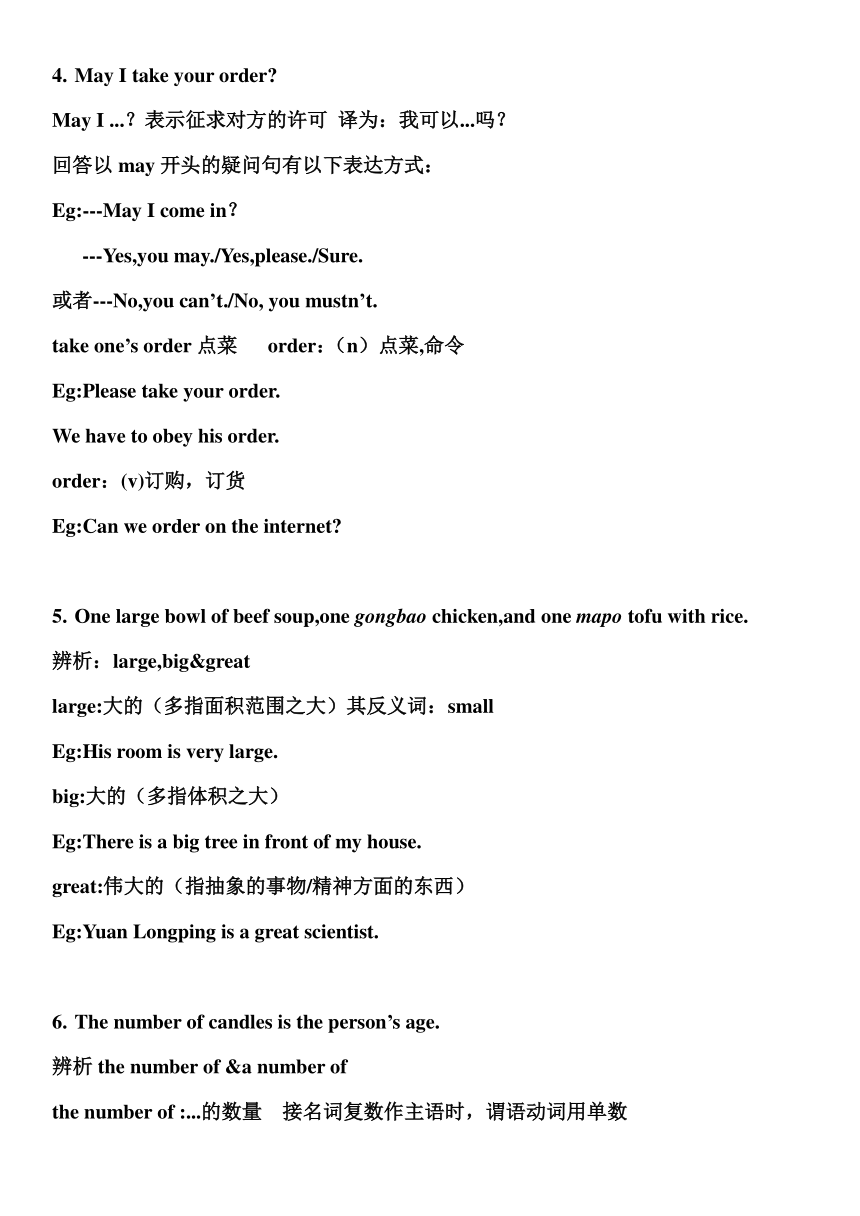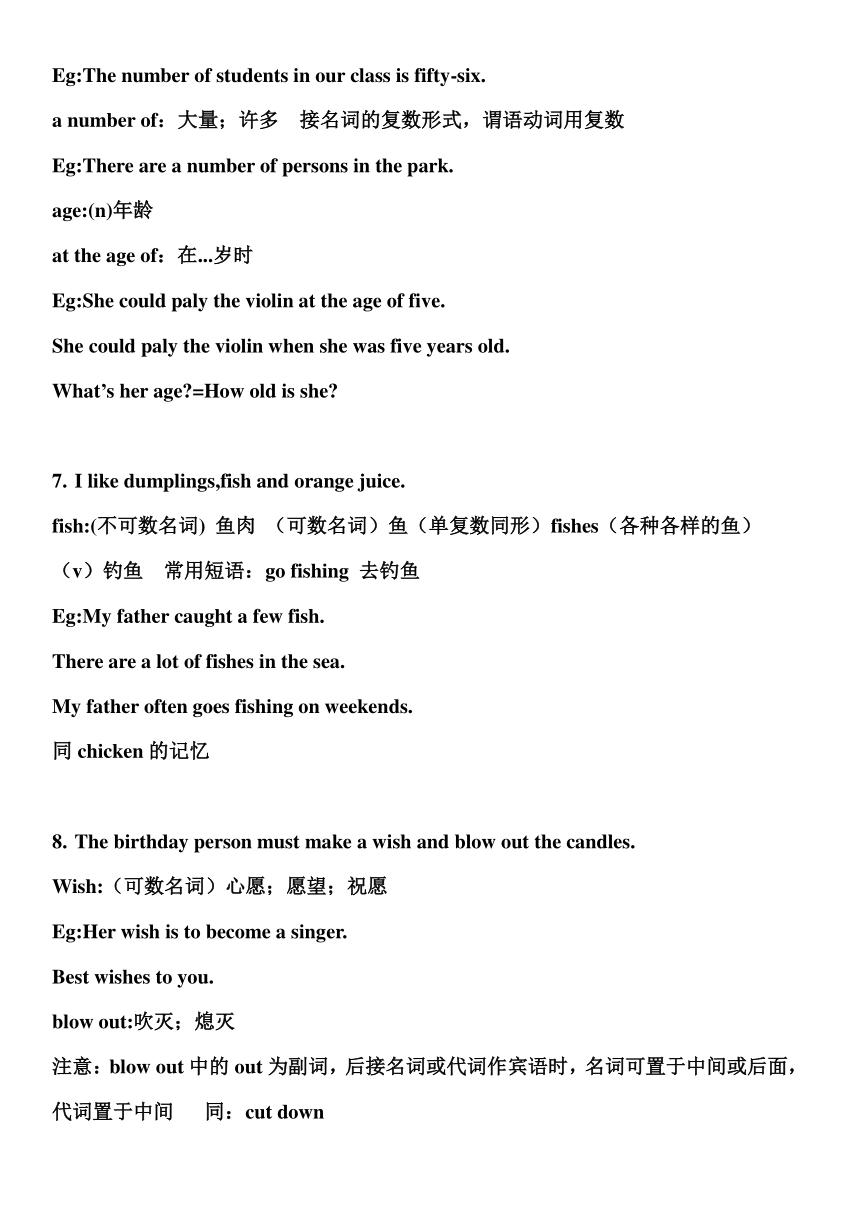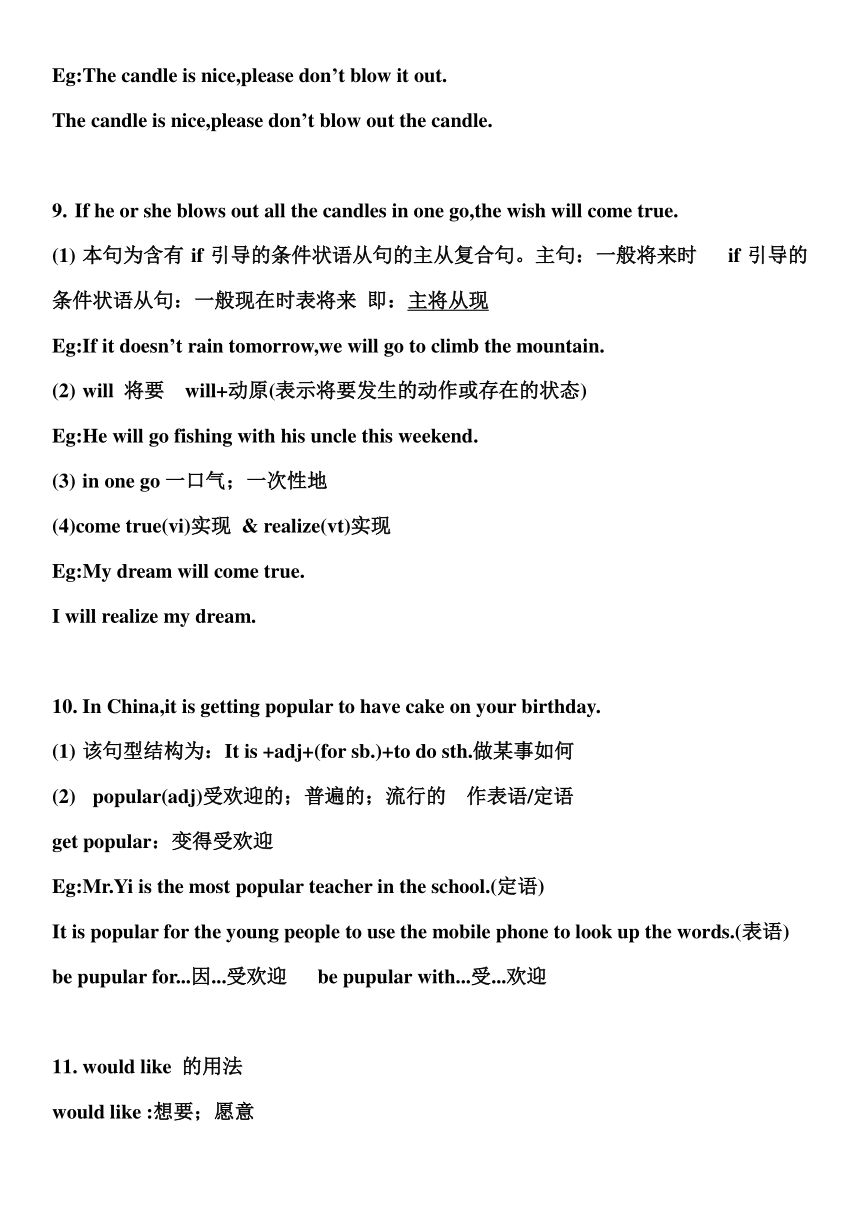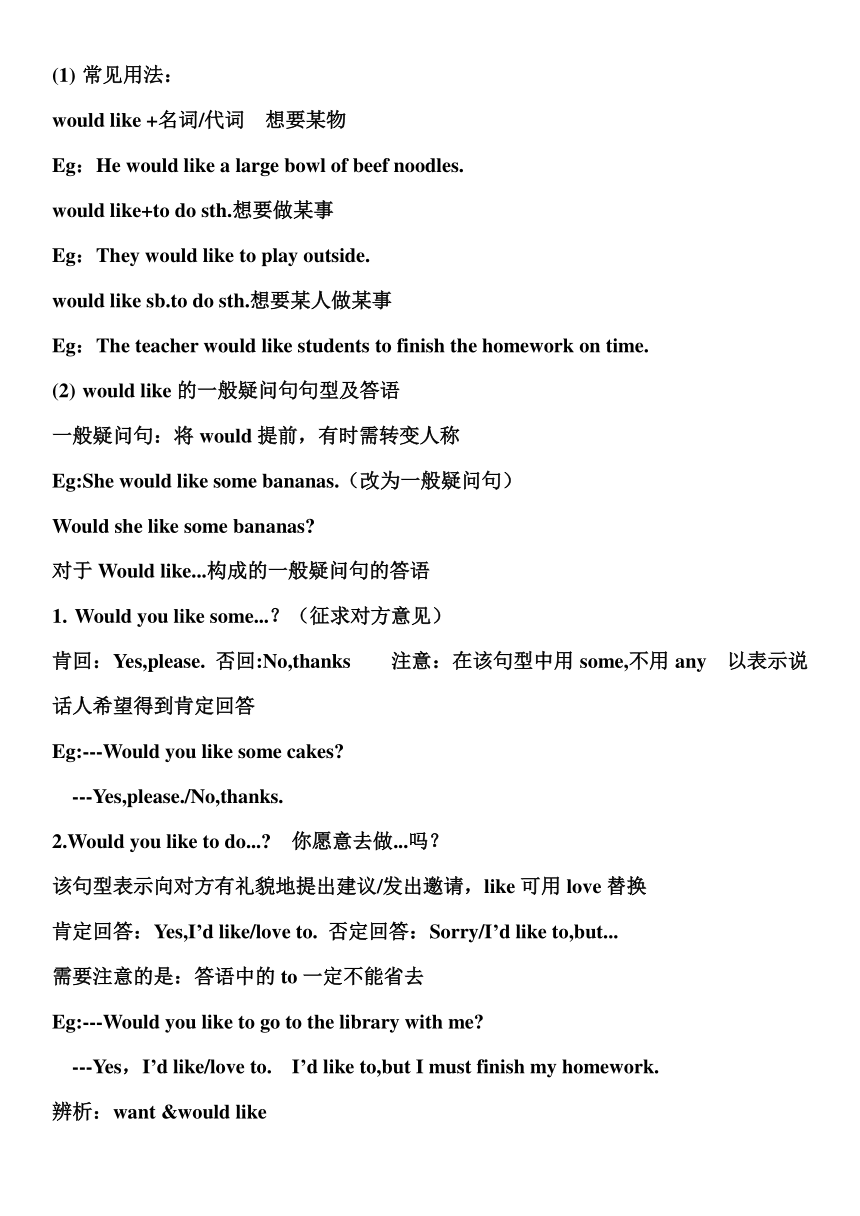人教版七年级下册Unit10I'd like some noodles.讲义练习 (含答案)
文档属性
| 名称 | 人教版七年级下册Unit10I'd like some noodles.讲义练习 (含答案) |  | |
| 格式 | docx | ||
| 文件大小 | 30.9KB | ||
| 资源类型 | 教案 | ||
| 版本资源 | 人教新目标(Go for it)版 | ||
| 科目 | 英语 | ||
| 更新时间 | 2024-05-06 08:27:33 | ||
图片预览





文档简介
Unit 10 I’d like some noodles
1.I’m not sure yet.
yet(adv):仍然;还 常用于否定句或疑问句中
Eg:They haven’t found the keys yet.
Special 1
Special:(n)特别的东西;特殊的事物 (adj)特别的;特殊的
Eg:I want to order the special.
September 28th is a special date for me.
与special相关的短语:
a special train 专列 special education 特殊教育
I’d like beef noodles.
beef noodles=noodles with beef 此时beef作定语修饰n
注意:n作定语修饰n,作定语的n一般只能用单数
Eg:apple trees hotel managers
名词作定语的特殊情况:
当man,woman 等名词作定语修饰复数名词时,他们本身也要用复数形式
Eg:some women teachers一些女老师 two men doctors两位男医生
一些n用其复数形式作定语
Eg:a clothes shop 一家服装店 a sports meeting一场运动会
a glasses shop 一家眼镜店
May I take your order
May I ...?表示征求对方的许可 译为:我可以...吗?
回答以may开头的疑问句有以下表达方式:
Eg:---May I come in?
---Yes,you may./Yes,please./Sure.
或者---No,you can’t./No, you mustn’t.
take one’s order点菜 order:(n)点菜,命令
Eg:Please take your order.
We have to obey his order.
order:(v)订购,订货
Eg:Can we order on the internet
One large bowl of beef soup,one gongbao chicken,and one mapo tofu with rice.
辨析:large,big&great
large:大的(多指面积范围之大)其反义词:small
Eg:His room is very large.
big:大的(多指体积之大)
Eg:There is a big tree in front of my house.
great:伟大的(指抽象的事物/精神方面的东西)
Eg:Yuan Longping is a great scientist.
The number of candles is the person’s age.
辨析the number of &a number of
the number of :...的数量 接名词复数作主语时,谓语动词用单数
Eg:The number of students in our class is fifty-six.
a number of:大量;许多 接名词的复数形式,谓语动词用复数
Eg:There are a number of persons in the park.
age:(n)年龄
at the age of:在...岁时
Eg:She could paly the violin at the age of five.
She could paly the violin when she was five years old.
What’s her age =How old is she
I like dumplings,fish and orange juice.
fish:(不可数名词) 鱼肉 (可数名词)鱼(单复数同形)fishes(各种各样的鱼)
(v)钓鱼 常用短语:go fishing 去钓鱼
Eg:My father caught a few fish.
There are a lot of fishes in the sea.
My father often goes fishing on weekends.
同chicken的记忆
The birthday person must make a wish and blow out the candles.
Wish:(可数名词)心愿;愿望;祝愿
Eg:Her wish is to become a singer.
Best wishes to you.
blow out:吹灭;熄灭
注意:blow out中的out为副词,后接名词或代词作宾语时,名词可置于中间或后面,代词置于中间 同:cut down
Eg:The candle is nice,please don’t blow it out.
The candle is nice,please don’t blow out the candle.
If he or she blows out all the candles in one go,the wish will come true.
本句为含有if引导的条件状语从句的主从复合句。主句:一般将来时 if引导的条件状语从句:一般现在时表将来 即:主将从现
Eg:If it doesn’t rain tomorrow,we will go to climb the mountain.
will 将要 will+动原(表示将要发生的动作或存在的状态)
Eg:He will go fishing with his uncle this weekend.
in one go一口气;一次性地
(4)come true(vi)实现 & realize(vt)实现
Eg:My dream will come true.
I will realize my dream.
In China,it is getting popular to have cake on your birthday.
该句型结构为:It is +adj+(for sb.)+to do sth.做某事如何
popular(adj)受欢迎的;普遍的;流行的 作表语/定语
get popular:变得受欢迎
Eg:Mr.Yi is the most popular teacher in the school.(定语)
It is popular for the young people to use the mobile phone to look up the words.(表语)
be pupular for...因...受欢迎 be pupular with...受...欢迎
would like 的用法
would like :想要;愿意
常见用法:
would like +名词/代词 想要某物
Eg:He would like a large bowl of beef noodles.
would like+to do sth.想要做某事
Eg:They would like to play outside.
would like sb.to do sth.想要某人做某事
Eg:The teacher would like students to finish the homework on time.
would like的一般疑问句句型及答语
一般疑问句:将would提前,有时需转变人称
Eg:She would like some bananas.(改为一般疑问句)
Would she like some bananas
对于Would like...构成的一般疑问句的答语
Would you like some...?(征求对方意见)
肯回:Yes,please. 否回:No,thanks 注意:在该句型中用some,不用any 以表示说话人希望得到肯定回答
Eg:---Would you like some cakes
---Yes,please./No,thanks.
2.Would you like to do... 你愿意去做...吗?
该句型表示向对方有礼貌地提出建议/发出邀请,like可用love替换
肯定回答:Yes,I’d like/love to. 否定回答:Sorry/I’d like to,but...
需要注意的是:答语中的to一定不能省去
Eg:---Would you like to go to the library with me
---Yes,I’d like/love to. I’d like to,but I must finish my homework.
辨析:want &would like
want:(v)有人称、数和时态的变化 在它构成的疑问句/否定句中,some要变成any
would like:没有人称、数和时态的变化 在它构成的疑问句中,some不必变成any
Eg:Tom wants to be a basketball player.
Do you want any cakes
Would you like some bread
同步练习
Unit 10 I'd like some noodles.
一、单项选择(每小题1分,共15分)
1.Tom, can you help me buy ________ onion and ________ potato
A.a; a B.a; an C.an; a D.an; an
【答案】C
【详解】句意:汤姆,你能帮我买一个洋葱和一个土豆吗?
考查不定冠词。onion以元音音素开头,其前用不定冠词an;potato以辅音音素开头,其前用不定冠词a。故选C。
2.I don’t like eating ________, but I have two ________.
A.chickens; chicken B.chickens; chickens C.chicken; chickens D.chicken; chicken
【答案】C
【详解】句意:我不喜欢吃鸡肉,但我有两只鸡。
考查名词。chicken作“鸡肉”讲时,是不可数名词;作“鸡”讲时,是可数名词;由“like eating”可知,第一空指的是“鸡肉”,是不可数名词;第二空前有two修饰,所以应该是可数名词,需要用复数形式,故选C。
3.—______ rice would you like —Large, please.
A.What kind of B.What size bowl of
C.What size of D.What
【答案】B
【详解】句意:-你想要多大一碗米饭?-请来个中碗的。A. What kind of什么种类;B. What size bowl of多大碗的;C. What size of什么尺寸的;D. What什么。Rice是不可数名词,不能说多少、大小,可以用盛装它的容器来描述其多少。所以回答中的large指的是碗的大小,故选B。
4.—Keep the leaf. It will bring good ________to you and your family.
—Thanks. I will.
A.unlucky B.luckily C.lucky D.luck
【答案】D
【详解】句意:——保存这片树叶。它会给你和你的家人带来好运。——谢谢。我会的。
考查词性辨析。unlucky不幸的,形容词;luckily幸运地,副词;lucky幸运的,形容词;luck幸运,名词。bring sth to sb“给某人带来某物”,空处应该用名词作动词bring的宾语。故选D。
5.—Would you like some ice-cream, Vera
—________. It’s my favorite.
A.No, I’m not thirsty B.No, thanks C.Yes, I do D.Yes, please
【答案】D
【详解】句意:——维拉,你想吃冰淇淋吗?——好的,谢谢。这是我最喜欢的。
考查情景交际。No, I’m not thirsty不,我不渴;No, thanks不了,谢谢;Yes, I do是的;Yes, please是的,请。问句是“Would you like+名词... ”,其回答为:Yes, please./No, thank you.;C选项是用来回答“do”开头的一般疑问句,排除C。根据“It’s my favorite.”可知,此处是作肯定回答。故选D。
6.Bob, please _______ the meat. We will make dumplings.
A.cut down B.blow down C.cut up D.blow out
【答案】C
【详解】句意:Bob,请把肉切碎,我们要包饺子。
考查动词短语辨析。cut down砍倒,削减;blow down吹倒;炸毁;cut up切碎;剁碎;blow out吹灭。根据句意“We will make dumplings”可知,包饺子应该把肉剁碎,C选项符合语境,故选C。
7.________ many countries, people have birthday cakes ________ candles.
A.In; with B.On; for C.In; at D.On; at
【答案】A
【详解】句意:在许多国家,人们吃带有蜡烛的生日蛋糕。
考查介词辨析。In在……里;with带有;On在……上;for为了;at在。根据“many countries”可知,在许多国家,应用介词in,排除B、D项;再根据“birthday cakes…candles”和常识可知,一般生日蛋糕带有蜡烛,应用with。故选A。
8.There _____ a number of books in the library and the number of them _____ increasing.
A.has, is B.have,are C.are,is D.is,are
【答案】C
【详解】句意:图书馆里有大量的书籍,它们的数量正在增加。
考查there be句型和主谓一致的用法。there be“某处有某物”,不和have同用,故排除AB;there be使用就近原则,因为a number of“大量,许多”后跟可数名词复数形式作主语时,be动词要用复数形式,故排除D;the number of“……的数量”作主语时,be动词要用单数形式。故选C。
9.—People in China usually eat noodles ________ their birthdays.
—Yes, and they never cut ________ the long noodles.
A.on; down B.to; up C.to; down D.on; up
【答案】D
【详解】句意:——中国人通常在生日那天吃面条。——是的,而且他们从不切长面条。
考查时间介词和动词短语。表示在具体的某一天,用介词on;cut down“砍倒”;cut up“切断”。分析句意可知此处表示“他们从不切断长面条”。故选D。
10.—What can I do for you —I’d like __________and __________.
A.three orange;two orange juice B.three oranges;two glasses of orange juice
C.three oranges;two glass of orange juice D.three oranges;two glasses of oranges juice
【答案】B
【详解】句意:-买点儿什么?-我要三个桔子和两杯橙汁。前空表示“三个桔子”,orange意思是“桔子”时,是可数名词,三个桔子,要用复数形式:three oranges;后空中juice是不可数名词,不直接与基数词two连用。一杯橙汁:a glass of orange juice,表示“多杯橙汁”时,glass是可数名词,要用复数形式。两杯橙汁:two glasses of orange juice.故选B。
11.The wind ________ hard outside. We can’t go out to play football.
A.blow B.blowing C.is blowing D.to blow
【答案】C
【详解】句意:现在外面的风吹得很大。我们不能出去踢足球。
考查动词的时态。根据“We can’t go out to play football.”可推知外面正在刮大风,故此处应用现在进行时。故选C。
12.________ is getting popular ________ music when walking.
A.It; to listen B.That; listening C.This; listening D.It; to listen to
【答案】D
【详解】句意:走路时听音乐越来越流行了。
考查代词辨析和非谓语动词。根据“…is getting popular…music when walking.”可知,该句要用it作形式主语,动词不定式作真正的主语;固定短语listen to music“听音乐”,to不能省略。故选D。
13.—Would you like ________ football with us
—Certainly. I like ________ football very much.
A.to play; play B.playing; to play C.to play; playing D.playing; playing
【答案】C
【详解】句意:——你想和我们一起踢足球吗?——当然。我非常喜欢踢足球。
考查非谓语动词。空一考查would like to do sth“想要做某事,愿意做某事”,动词不定式作宾语,用to play,排除B和D;空二考查like doing sth“喜欢做某事”,动名词作宾语,用playing。故选C。
14.—Dad, I’m hungry (饥饿的) now. Can I eat some ________
—Sure, dear. Let me get them for you.
A.candles B.water C.pancakes D.potato
【答案】C
【详解】句意:——爸爸,我现在饿了。我能吃些煎饼吗?——当然可以,亲爱的。让我给你拿。
考查名词辨析。candle蜡烛;water水;pancake煎饼;potato土豆。根据“Let me get them for you.”可推断出此处应该用可数名词复数;又根据“I’m hungry (饥饿的) now,”可知pancakes符合语境。故选C。
15.— ________
— Yes. Some specials in your restaurant, please.
A.Are you OK B.May I take your order
C.How much is it D.Can you help me
【答案】B
【详解】句意:——您现在可以点餐了吗?——好的。请给我一些你们餐厅的特色菜。
考查交际用语。Are you OK你还好吗;May I take your order您现在可以点餐了吗?How much is it多少钱;Can you help me你能帮助我吗。根据“Yes. Some specials in your restaurant, please.”可知,这是关于就餐的对话,问是否点餐,故选B。
二、完形填空(每小题1分,共10分)
It is Laura’s birthday today. Her family have a birthday party ____16____ her in the restaurant. Her father buys some candies. Her mother ____17____ a birthday cake. When all the people ____18____, the party begins. Laura ____19____ a birthday hat. After she makes a wish, she ____20____ all the candles. The number of the candles ____21____ thirteen because this is Laura’s thirteenth birthday.
In the evening, Laura’s mother cooks a large bowl of noodles for her. There are two ____22____ in it. The noodles are very ____23____. Her mother says they are a ____24____ of long life. She also says the eggs can _____25_____ good luck to her. Laura is very happy today.
16.A.to B.for C.from D.at
17.A.sells B.draws C.eats D.makes
18.A.arrive B.leave C.sleep D.get
19.A.puts B.takes C.wears D.keeps
20.A.cuts out B.blows out C.makes out D.eats out
21.A.be B.am C.is D.are
22.A.cakes B.pancakes C.candies D.eggs
23.A.long B.short C.large D.small
24.A.rule B.symbol C.way D.gift
25.A.describe B.follow C.build D.bring
【答案】
16.B 17.D 18.A 19.C 20.B 21.C 22.D 23.A 24.B 25.D
【导语】
本文主要讲述了劳拉过生日的经过。
【详解】
16.句意:她的家人在饭店为她举行生日聚会。
to到;for为了;from来自;at在……。根据句意可知,是在饭店为她举行生日聚会。故选B。
17.句意:她妈妈做了一个生日蛋糕。
sells卖;draws画;eats吃;makes制作。承接前句“Her father buys some candies.”的语境可知,应是妈妈做了一个生日蛋糕。故选D。
18.句意:当所有人到达时,聚会开始了。
arrive到达;leave离开;sleep睡觉;get得到。根据常识可知,应是当所有人都到达的时候,聚会开始。故选A。
19.句意:劳拉戴着一顶生日帽。
puts放;takes拿走;wears戴着;keeps保留。根据常识可知,过生日的人通常戴着一顶生日帽。故选C。
20.句意:她许愿后,吹灭了所有的蜡烛。
cuts out切断;blows out吹灭;makes out弄清、辨认出;eats out出去吃饭。根据常识可知许完愿后应该是吹灭蜡烛。故选B。
21.句意:蜡烛的数量是十三支,因为今天是劳拉的十三岁生日。
be动词原形;am用于第一人称单数形式;is用于第三人称单数形式;are用于复数和第二人称。the number of “……的数量”,在句中作主语时,谓语动词用第三人称单数形式。故系动词应用is。故选C。
22.句意:里面有两个鸡蛋。
cakes蛋糕;pancakes烙饼;candies糖果;eggs鸡蛋。根据下文“She also says the eggs can…good luck to her.”可知,应是里面有鸡蛋。故选D。
23.句意:面条很长。
long长的;short短的;large大的;small小的。根据下句“Her mother says they are a…of long life.”可知,应是面条很长。故选A。
24.句意:她妈妈说它们是长寿的象征。
rule规定;symbol象征;way方法;gift礼物。a symbol of “……的象征”,固定短语。选B。
25.句意:她还说鸡蛋能给她带来好运。
describe描述;follow跟随;build建造;bring带来。bring sth. to sb.“把某物带给某人”,固定搭配。故选D。
1.I’m not sure yet.
yet(adv):仍然;还 常用于否定句或疑问句中
Eg:They haven’t found the keys yet.
Special 1
Special:(n)特别的东西;特殊的事物 (adj)特别的;特殊的
Eg:I want to order the special.
September 28th is a special date for me.
与special相关的短语:
a special train 专列 special education 特殊教育
I’d like beef noodles.
beef noodles=noodles with beef 此时beef作定语修饰n
注意:n作定语修饰n,作定语的n一般只能用单数
Eg:apple trees hotel managers
名词作定语的特殊情况:
当man,woman 等名词作定语修饰复数名词时,他们本身也要用复数形式
Eg:some women teachers一些女老师 two men doctors两位男医生
一些n用其复数形式作定语
Eg:a clothes shop 一家服装店 a sports meeting一场运动会
a glasses shop 一家眼镜店
May I take your order
May I ...?表示征求对方的许可 译为:我可以...吗?
回答以may开头的疑问句有以下表达方式:
Eg:---May I come in?
---Yes,you may./Yes,please./Sure.
或者---No,you can’t./No, you mustn’t.
take one’s order点菜 order:(n)点菜,命令
Eg:Please take your order.
We have to obey his order.
order:(v)订购,订货
Eg:Can we order on the internet
One large bowl of beef soup,one gongbao chicken,and one mapo tofu with rice.
辨析:large,big&great
large:大的(多指面积范围之大)其反义词:small
Eg:His room is very large.
big:大的(多指体积之大)
Eg:There is a big tree in front of my house.
great:伟大的(指抽象的事物/精神方面的东西)
Eg:Yuan Longping is a great scientist.
The number of candles is the person’s age.
辨析the number of &a number of
the number of :...的数量 接名词复数作主语时,谓语动词用单数
Eg:The number of students in our class is fifty-six.
a number of:大量;许多 接名词的复数形式,谓语动词用复数
Eg:There are a number of persons in the park.
age:(n)年龄
at the age of:在...岁时
Eg:She could paly the violin at the age of five.
She could paly the violin when she was five years old.
What’s her age =How old is she
I like dumplings,fish and orange juice.
fish:(不可数名词) 鱼肉 (可数名词)鱼(单复数同形)fishes(各种各样的鱼)
(v)钓鱼 常用短语:go fishing 去钓鱼
Eg:My father caught a few fish.
There are a lot of fishes in the sea.
My father often goes fishing on weekends.
同chicken的记忆
The birthday person must make a wish and blow out the candles.
Wish:(可数名词)心愿;愿望;祝愿
Eg:Her wish is to become a singer.
Best wishes to you.
blow out:吹灭;熄灭
注意:blow out中的out为副词,后接名词或代词作宾语时,名词可置于中间或后面,代词置于中间 同:cut down
Eg:The candle is nice,please don’t blow it out.
The candle is nice,please don’t blow out the candle.
If he or she blows out all the candles in one go,the wish will come true.
本句为含有if引导的条件状语从句的主从复合句。主句:一般将来时 if引导的条件状语从句:一般现在时表将来 即:主将从现
Eg:If it doesn’t rain tomorrow,we will go to climb the mountain.
will 将要 will+动原(表示将要发生的动作或存在的状态)
Eg:He will go fishing with his uncle this weekend.
in one go一口气;一次性地
(4)come true(vi)实现 & realize(vt)实现
Eg:My dream will come true.
I will realize my dream.
In China,it is getting popular to have cake on your birthday.
该句型结构为:It is +adj+(for sb.)+to do sth.做某事如何
popular(adj)受欢迎的;普遍的;流行的 作表语/定语
get popular:变得受欢迎
Eg:Mr.Yi is the most popular teacher in the school.(定语)
It is popular for the young people to use the mobile phone to look up the words.(表语)
be pupular for...因...受欢迎 be pupular with...受...欢迎
would like 的用法
would like :想要;愿意
常见用法:
would like +名词/代词 想要某物
Eg:He would like a large bowl of beef noodles.
would like+to do sth.想要做某事
Eg:They would like to play outside.
would like sb.to do sth.想要某人做某事
Eg:The teacher would like students to finish the homework on time.
would like的一般疑问句句型及答语
一般疑问句:将would提前,有时需转变人称
Eg:She would like some bananas.(改为一般疑问句)
Would she like some bananas
对于Would like...构成的一般疑问句的答语
Would you like some...?(征求对方意见)
肯回:Yes,please. 否回:No,thanks 注意:在该句型中用some,不用any 以表示说话人希望得到肯定回答
Eg:---Would you like some cakes
---Yes,please./No,thanks.
2.Would you like to do... 你愿意去做...吗?
该句型表示向对方有礼貌地提出建议/发出邀请,like可用love替换
肯定回答:Yes,I’d like/love to. 否定回答:Sorry/I’d like to,but...
需要注意的是:答语中的to一定不能省去
Eg:---Would you like to go to the library with me
---Yes,I’d like/love to. I’d like to,but I must finish my homework.
辨析:want &would like
want:(v)有人称、数和时态的变化 在它构成的疑问句/否定句中,some要变成any
would like:没有人称、数和时态的变化 在它构成的疑问句中,some不必变成any
Eg:Tom wants to be a basketball player.
Do you want any cakes
Would you like some bread
同步练习
Unit 10 I'd like some noodles.
一、单项选择(每小题1分,共15分)
1.Tom, can you help me buy ________ onion and ________ potato
A.a; a B.a; an C.an; a D.an; an
【答案】C
【详解】句意:汤姆,你能帮我买一个洋葱和一个土豆吗?
考查不定冠词。onion以元音音素开头,其前用不定冠词an;potato以辅音音素开头,其前用不定冠词a。故选C。
2.I don’t like eating ________, but I have two ________.
A.chickens; chicken B.chickens; chickens C.chicken; chickens D.chicken; chicken
【答案】C
【详解】句意:我不喜欢吃鸡肉,但我有两只鸡。
考查名词。chicken作“鸡肉”讲时,是不可数名词;作“鸡”讲时,是可数名词;由“like eating”可知,第一空指的是“鸡肉”,是不可数名词;第二空前有two修饰,所以应该是可数名词,需要用复数形式,故选C。
3.—______ rice would you like —Large, please.
A.What kind of B.What size bowl of
C.What size of D.What
【答案】B
【详解】句意:-你想要多大一碗米饭?-请来个中碗的。A. What kind of什么种类;B. What size bowl of多大碗的;C. What size of什么尺寸的;D. What什么。Rice是不可数名词,不能说多少、大小,可以用盛装它的容器来描述其多少。所以回答中的large指的是碗的大小,故选B。
4.—Keep the leaf. It will bring good ________to you and your family.
—Thanks. I will.
A.unlucky B.luckily C.lucky D.luck
【答案】D
【详解】句意:——保存这片树叶。它会给你和你的家人带来好运。——谢谢。我会的。
考查词性辨析。unlucky不幸的,形容词;luckily幸运地,副词;lucky幸运的,形容词;luck幸运,名词。bring sth to sb“给某人带来某物”,空处应该用名词作动词bring的宾语。故选D。
5.—Would you like some ice-cream, Vera
—________. It’s my favorite.
A.No, I’m not thirsty B.No, thanks C.Yes, I do D.Yes, please
【答案】D
【详解】句意:——维拉,你想吃冰淇淋吗?——好的,谢谢。这是我最喜欢的。
考查情景交际。No, I’m not thirsty不,我不渴;No, thanks不了,谢谢;Yes, I do是的;Yes, please是的,请。问句是“Would you like+名词... ”,其回答为:Yes, please./No, thank you.;C选项是用来回答“do”开头的一般疑问句,排除C。根据“It’s my favorite.”可知,此处是作肯定回答。故选D。
6.Bob, please _______ the meat. We will make dumplings.
A.cut down B.blow down C.cut up D.blow out
【答案】C
【详解】句意:Bob,请把肉切碎,我们要包饺子。
考查动词短语辨析。cut down砍倒,削减;blow down吹倒;炸毁;cut up切碎;剁碎;blow out吹灭。根据句意“We will make dumplings”可知,包饺子应该把肉剁碎,C选项符合语境,故选C。
7.________ many countries, people have birthday cakes ________ candles.
A.In; with B.On; for C.In; at D.On; at
【答案】A
【详解】句意:在许多国家,人们吃带有蜡烛的生日蛋糕。
考查介词辨析。In在……里;with带有;On在……上;for为了;at在。根据“many countries”可知,在许多国家,应用介词in,排除B、D项;再根据“birthday cakes…candles”和常识可知,一般生日蛋糕带有蜡烛,应用with。故选A。
8.There _____ a number of books in the library and the number of them _____ increasing.
A.has, is B.have,are C.are,is D.is,are
【答案】C
【详解】句意:图书馆里有大量的书籍,它们的数量正在增加。
考查there be句型和主谓一致的用法。there be“某处有某物”,不和have同用,故排除AB;there be使用就近原则,因为a number of“大量,许多”后跟可数名词复数形式作主语时,be动词要用复数形式,故排除D;the number of“……的数量”作主语时,be动词要用单数形式。故选C。
9.—People in China usually eat noodles ________ their birthdays.
—Yes, and they never cut ________ the long noodles.
A.on; down B.to; up C.to; down D.on; up
【答案】D
【详解】句意:——中国人通常在生日那天吃面条。——是的,而且他们从不切长面条。
考查时间介词和动词短语。表示在具体的某一天,用介词on;cut down“砍倒”;cut up“切断”。分析句意可知此处表示“他们从不切断长面条”。故选D。
10.—What can I do for you —I’d like __________and __________.
A.three orange;two orange juice B.three oranges;two glasses of orange juice
C.three oranges;two glass of orange juice D.three oranges;two glasses of oranges juice
【答案】B
【详解】句意:-买点儿什么?-我要三个桔子和两杯橙汁。前空表示“三个桔子”,orange意思是“桔子”时,是可数名词,三个桔子,要用复数形式:three oranges;后空中juice是不可数名词,不直接与基数词two连用。一杯橙汁:a glass of orange juice,表示“多杯橙汁”时,glass是可数名词,要用复数形式。两杯橙汁:two glasses of orange juice.故选B。
11.The wind ________ hard outside. We can’t go out to play football.
A.blow B.blowing C.is blowing D.to blow
【答案】C
【详解】句意:现在外面的风吹得很大。我们不能出去踢足球。
考查动词的时态。根据“We can’t go out to play football.”可推知外面正在刮大风,故此处应用现在进行时。故选C。
12.________ is getting popular ________ music when walking.
A.It; to listen B.That; listening C.This; listening D.It; to listen to
【答案】D
【详解】句意:走路时听音乐越来越流行了。
考查代词辨析和非谓语动词。根据“…is getting popular…music when walking.”可知,该句要用it作形式主语,动词不定式作真正的主语;固定短语listen to music“听音乐”,to不能省略。故选D。
13.—Would you like ________ football with us
—Certainly. I like ________ football very much.
A.to play; play B.playing; to play C.to play; playing D.playing; playing
【答案】C
【详解】句意:——你想和我们一起踢足球吗?——当然。我非常喜欢踢足球。
考查非谓语动词。空一考查would like to do sth“想要做某事,愿意做某事”,动词不定式作宾语,用to play,排除B和D;空二考查like doing sth“喜欢做某事”,动名词作宾语,用playing。故选C。
14.—Dad, I’m hungry (饥饿的) now. Can I eat some ________
—Sure, dear. Let me get them for you.
A.candles B.water C.pancakes D.potato
【答案】C
【详解】句意:——爸爸,我现在饿了。我能吃些煎饼吗?——当然可以,亲爱的。让我给你拿。
考查名词辨析。candle蜡烛;water水;pancake煎饼;potato土豆。根据“Let me get them for you.”可推断出此处应该用可数名词复数;又根据“I’m hungry (饥饿的) now,”可知pancakes符合语境。故选C。
15.— ________
— Yes. Some specials in your restaurant, please.
A.Are you OK B.May I take your order
C.How much is it D.Can you help me
【答案】B
【详解】句意:——您现在可以点餐了吗?——好的。请给我一些你们餐厅的特色菜。
考查交际用语。Are you OK你还好吗;May I take your order您现在可以点餐了吗?How much is it多少钱;Can you help me你能帮助我吗。根据“Yes. Some specials in your restaurant, please.”可知,这是关于就餐的对话,问是否点餐,故选B。
二、完形填空(每小题1分,共10分)
It is Laura’s birthday today. Her family have a birthday party ____16____ her in the restaurant. Her father buys some candies. Her mother ____17____ a birthday cake. When all the people ____18____, the party begins. Laura ____19____ a birthday hat. After she makes a wish, she ____20____ all the candles. The number of the candles ____21____ thirteen because this is Laura’s thirteenth birthday.
In the evening, Laura’s mother cooks a large bowl of noodles for her. There are two ____22____ in it. The noodles are very ____23____. Her mother says they are a ____24____ of long life. She also says the eggs can _____25_____ good luck to her. Laura is very happy today.
16.A.to B.for C.from D.at
17.A.sells B.draws C.eats D.makes
18.A.arrive B.leave C.sleep D.get
19.A.puts B.takes C.wears D.keeps
20.A.cuts out B.blows out C.makes out D.eats out
21.A.be B.am C.is D.are
22.A.cakes B.pancakes C.candies D.eggs
23.A.long B.short C.large D.small
24.A.rule B.symbol C.way D.gift
25.A.describe B.follow C.build D.bring
【答案】
16.B 17.D 18.A 19.C 20.B 21.C 22.D 23.A 24.B 25.D
【导语】
本文主要讲述了劳拉过生日的经过。
【详解】
16.句意:她的家人在饭店为她举行生日聚会。
to到;for为了;from来自;at在……。根据句意可知,是在饭店为她举行生日聚会。故选B。
17.句意:她妈妈做了一个生日蛋糕。
sells卖;draws画;eats吃;makes制作。承接前句“Her father buys some candies.”的语境可知,应是妈妈做了一个生日蛋糕。故选D。
18.句意:当所有人到达时,聚会开始了。
arrive到达;leave离开;sleep睡觉;get得到。根据常识可知,应是当所有人都到达的时候,聚会开始。故选A。
19.句意:劳拉戴着一顶生日帽。
puts放;takes拿走;wears戴着;keeps保留。根据常识可知,过生日的人通常戴着一顶生日帽。故选C。
20.句意:她许愿后,吹灭了所有的蜡烛。
cuts out切断;blows out吹灭;makes out弄清、辨认出;eats out出去吃饭。根据常识可知许完愿后应该是吹灭蜡烛。故选B。
21.句意:蜡烛的数量是十三支,因为今天是劳拉的十三岁生日。
be动词原形;am用于第一人称单数形式;is用于第三人称单数形式;are用于复数和第二人称。the number of “……的数量”,在句中作主语时,谓语动词用第三人称单数形式。故系动词应用is。故选C。
22.句意:里面有两个鸡蛋。
cakes蛋糕;pancakes烙饼;candies糖果;eggs鸡蛋。根据下文“She also says the eggs can…good luck to her.”可知,应是里面有鸡蛋。故选D。
23.句意:面条很长。
long长的;short短的;large大的;small小的。根据下句“Her mother says they are a…of long life.”可知,应是面条很长。故选A。
24.句意:她妈妈说它们是长寿的象征。
rule规定;symbol象征;way方法;gift礼物。a symbol of “……的象征”,固定短语。选B。
25.句意:她还说鸡蛋能给她带来好运。
describe描述;follow跟随;build建造;bring带来。bring sth. to sb.“把某物带给某人”,固定搭配。故选D。
同课章节目录
- Unit 1 Can you play the guitar?
- Section A
- Section B
- Unit 2 What time do you go to school?
- Section A
- Section B
- Unit 3 How do you get to school?
- Section A
- Section B
- Unit 4 Don't eat in class.
- Section A
- Section B
- Unit 5 Why do you like pandas?
- Section A
- Section B
- Unit 6 I'm watching TV.
- Section A
- Section B
- Review of Units 1-6
- Unit 7 It's raining!
- Section A
- Section B
- Unit 8 Is there a post office near here?
- Section A
- Section B
- Unit 9 What does he look like?
- Section A
- Section B
- Unit 10 I'd like some noodles.
- Section A
- Section B
- Unit 11 How was your school trip?
- Section A
- Section B
- Unit 12 What did you do last weekend?
- Section A
- Section B
